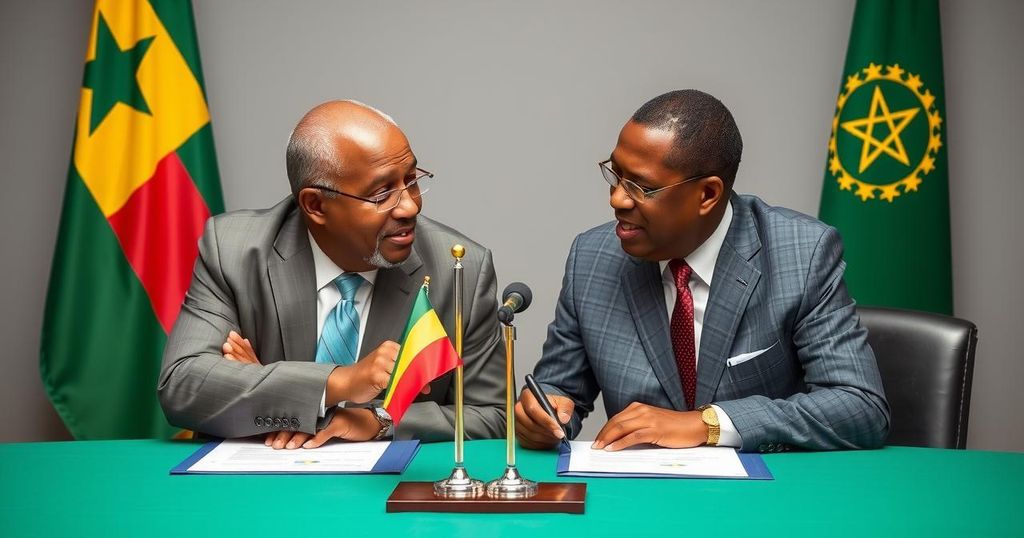The African Union has urged Somalia and Ethiopia to swiftly implement a recent accord designed to ease tensions over Ethiopia’s maritime access. The agreement follows heightened tensions after Ethiopia’s controversial deal with Somaliland. Both countries are expected to engage in discussions to ensure Ethiopia’s sustainable access to the sea while respecting Somalia’s sovereignty.
The African Union (AU) has called upon Somalia and Ethiopia to expedite the implementation of a significant accord aimed at reducing tensions regarding Ethiopia’s pursuit of maritime access. AU Commission Chairman Moussa Faki Mahamat described the agreement as a pivotal action and emphasized the necessity for immediate steps to affirm the resolution. Heightened tensions arose in January when Ethiopia entered into a contentious accord with Somaliland, a self-declared independent territory of Somalia, concerning the leasing of coastal land for a port and military facility, further indicating Ethiopia’s potential recognition of Somaliland’s independence—a notion firmly opposed by Somalia over concerns of sovereignty.
The latest discussions, facilitated by Turkey, yielded this historic agreement that Turkish President Recep Tayyip Erdoğan heralded as a move towards facilitating maritime access for Ethiopia, which has been landlocked since Eritrea’s independence in 1993. The agreement lays out a commitment from both nations to amicably resolve their disagreements and collaborate on shared prosperity. It includes provisions for technical discussions regarding commercial and bilateral arrangements to ensure Ethiopia gains “reliable, safe, and sustainable” access to the sea, to be exercised under Somalia’s sovereign authority.
The initial discussions relating to this accord are expected to commence by February and to be finalized within four months, with Turkey available to mediate should circumstances require it. However, ambiguity surrounds the status of Ethiopia’s existing arrangement with Somaliland, with reports indicating that the new agreement may not annul the prior memorandum of understanding. The AU and the Intergovernmental Authority on Development (IGAD) have both expressed their approval of this agreement, characterizing it as a critical movement toward resolving existing bilateral challenges. IGAD Secretary Workneh Gebeyehu hailed it as an indication of both parties’ dedication to peaceful resolutions.
Somali President Hassan Sheikh Mohamud voiced the significance of fostering peace and collaboration in the region, with Ethiopian Prime Minister Abiy Ahmed acknowledging his nation’s necessity for coastal access while explicitly stating there is no intention to engage in conflict over this matter. Although this agreement represents a fundamental shift in Ethiopia-Somalia relations, it also poses ongoing questions regarding Ethiopia’s engagement with Somaliland, challenging both nations to evolve this diplomatic success into veritable, sustainable outcomes.
The tensions between Somalia and Ethiopia erupted following Ethiopia’s agreement with Somaliland, which is regarded as a self-governing entity by some but is not widely recognized. The dispute primarily centers around Ethiopia’s need for sea access, which is crucial for its trade and economic development. The recent agreement brokered by Turkey is a diplomatic attempt to restore harmony between the nations and address the underlying sovereignty issues concerning the recognition of Somaliland. The involvement of both the AU and IGAD signifies the importance of this accord as a foundational step towards peace in the Horn of Africa.
In summary, the African Union’s call for prompt action on the Somalia-Ethiopia accord underscores a pivotal development in regional diplomacy aimed at easing longstanding tensions surrounding maritime access. The agreement establishes a framework for cooperation while preserving Somalia’s sovereignty, thereby laying the groundwork for future negotiations. As both nations move forward, the challenge will be to translate this diplomatic agreement into effective implementation and sustained peaceful relations.
Original Source: newscentral.africa






